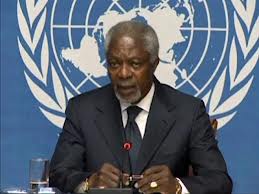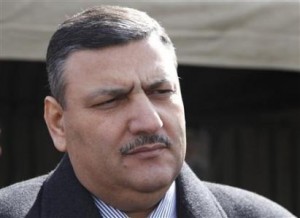
By: Jeffrey Laurenti*
Last Thursday United Nations mediator Kofi Annan announced he was folding his peacemaker’s tent, leaving Syria’s obdurate government to meet its fate in a test of arms. And the flight to Jordan Monday of Syrian prime minister Riyad Farid Hijab demonstrates that growing numbers of longtime stalwarts of the Ba’ath party regime — at least those from the country’s Sunni majority — now despair of a negotiated transition and want out.
Sauve qui peut — save yourself if you can. Hijab’s defection signals the broader rout that is underway. And Russia, the global defender of president Bashar al-Assad’s perquisites of sovereignty, has little time left to negotiate its own soft landing, or else reconcile itself to decades of unyielding hostility from the new Syrian regime, as the Americans have faced in post-Shah Iran.
The United States and Europe have navigated the Syrian crisis with much more dexterity, but only after having fed Russian paranoia by botching the implementation of the U.N. Security Council’s hard-won Libya resolution last year.
 By demanding the overthrow of Libya’s delusional dictator Muammar Gaddafi rather than the ceasefire and power-sharing transition with him that the council resolution had demanded, Western governments took on themselves the onus of fighting for “regime change” that led the Russians to dig in their heels on Syria. They didn’t need to: Gaddafi would have been even more uncompromising and treacherous in rejecting the U.N. terms than Assad has been.
By demanding the overthrow of Libya’s delusional dictator Muammar Gaddafi rather than the ceasefire and power-sharing transition with him that the council resolution had demanded, Western governments took on themselves the onus of fighting for “regime change” that led the Russians to dig in their heels on Syria. They didn’t need to: Gaddafi would have been even more uncompromising and treacherous in rejecting the U.N. terms than Assad has been.
Assad now faces accelerating demoralization among his soldiers and desperation among those who have been his political backers in Damascus and abroad. The civil administration and the Ba’ath party apparatus that had been the sinews of the Syrian state he has led are fast hollowing out. It seems unlikely that the Ba’ath party could depose Assad as the Fascist Grand Council had deposed Mussolini in July 1943, and a coup d’état led by the security forces seems even more improbable.
So it seems only Russia can still avert the final immolation of Syria’s five-decade-long regime. At this point Moscow will have to drop the pretense that Assad can still have a place at the table in a transitional government. In announcing his own resignation, Kofi Annan told Moscow publicly that he had concluded that “President Bashar al-Assad must leave office.”
Russia still has a few levers to pull with the men in Assad’s bunker. It can withhold the resupply of spent arms. If it wishes to “sauve qui peut,” in the sense of salvaging what it can for its own ties to post-Assad Syria, it has a fast-closing window of opportunity in the next few weeks. Moscow will have to tell Assad that he must require his government to implement fully all the terms of the Annan ceasefire — and that he must announce his resignation effective no later than the start of transition political talks.
With the dedicated peacemaker’s dogged determination to see a ray of light even at the darkest hour, Annan insisted that “Syria can still be saved from the worst calamity. But this requires courage and leadership, most of all from the permanent members of the Security Council, including from Presidents Putin and Obama.”
Yes, there is something that President Obama can do to provide cover for Russia to climb in off its limb and avert “the worst calamity.” His administration can announce that the United States will no longer object to Iranian participation in the “action group” of relevant countries Annan had sought to marshal to put concerted pressure on the Syrian antagonists to end the fighting and commence the political transition. With Assad’s own planned departure as part of the package, Obama would be trading a largely symbolic concession for a very dramatic change of direction by Putin.
As American leaders have learned to their sorrow, relying simply on force of arms — the trajectory of Syria today — builds in far more instability and risk than negotiating a managed political transition. The temptation to run the table, a temptation to which Bush administration policymakers fatefully succumbed in Afghanistan and Iraq, often runs strong in Washington, but in Syria the enigmatic character of many of the armed opposition factions should be a caution for compromise.
Syrians cannot be allowed to descend into two decades of civil war among armed sectarian militias, which looms as a very real scenario if armed opposition groups overwhelm the faltering government army. Lebanon’s horrendous experience in the final quarter of the last century must not play out on Syria’s larger stage.
It is surely clear even to Assad that his inner circle cannot govern Syria again. And it should be clear to the Russians that they have very little time left to save what they can.
* Senior Fellow, The Century Foundation
Huffington Post

Leave a Reply
You must be logged in to post a comment.